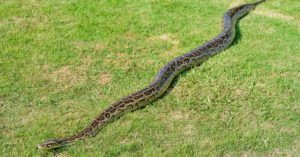If you’re the outdoorsy type, you likely know firsthand how important it is to be aware of your surroundings. Mother Nature is beautiful, but some of her creatures can be less than friendly if encountered. One in particular Florida residents should be aware of is alligators. These animals are present throughout the entire state, and they particularly enjoy taking up residence near small bodies of water, such as the Chipola River. Let’s explore why the Chipola River is home to so many alligators and review safety tips you can use if you find yourself face-to-face with one.
Chipola River: A Brief Overview

The Chipola River is home to a wide variety of wildlife.
©Johnsonw/Shutterstock.com
The Chipola River is a 92-mile-long tributary of the Apalachicola River located in Northwestern Florida. People who visit this area spend their time paddleboarding, kayaking, picnicking, and observing the local wildlife. According to the Florida Fish and Wildlife Conservation Commission, “The area is home to the rare Barbour’s map turtle as well as to numerous alligators, egrets, herons, ospreys, and songbirds.” Alligators in particular have had several encounters with humans in the past. But why are there so many living in this one concentrated area?
Why Is The Chipola River an Alligator Haven?
As we stated above, alligators live all across the state of Florida. However, certain areas are considered alligator hotspots while others are not. As swamps and other wetlands in Florida dry up, alligators begin migrating to other nearby bodies of water. The Chipola River, in particular, provides these animals with a suitable habitat and ample food sources, so many have chosen to spend their lives here. However, this has caused visiting locals quite a bit of trouble. Although they are rare, alligator attacks and close encounters have occurred here throughout the years. Individuals who visit this area for recreational purposes are encouraged to exercise caution around these animals.
How to Ensure Your Safety Around Alligators

Although some individuals recommend running away from alligators in a zig-zag pattern, running in a straight line is typically more effective.
©Wirestock Creators/Shutterstock.com
In most cases, alligators and humans are able to coexist peacefully. However, engaging in behavior that will ensure your safety always helps, especially while visiting areas where many alligators are present. Although it’s usually perfectly safe to observe alligators in their natural habitat from a distance, getting too close to one can provoke them to attack. Keep a distance of at least 10 feet from bodies of water where alligators are present, and 30 to 60 feet from ones on land. In addition, it’s important to never feed alligators or encourage them to approach you. Keep your children and pets nearby, and be aware of your surroundings. Avoid swimming in waters where alligators are present altogether to ensure your safety while visiting.
Final Thoughts
The Chipola River is a wonderful place where locals and tourists alike enjoy spending their time. As long as you practice proper safety measures when visiting, it is very unlikely that you or your family will have a negative encounter with an alligator. In fact, many people visit this river each year and observe these animals from a safe distance without a hitch.
Thank you for reading! Have some feedback for us? Contact the AZ Animals editorial team.








